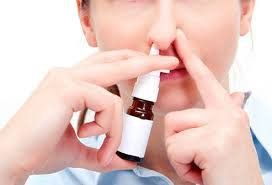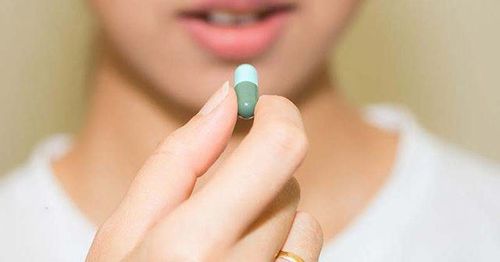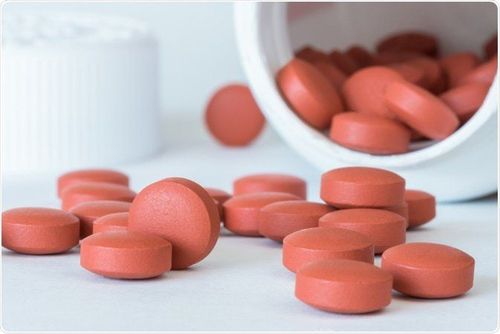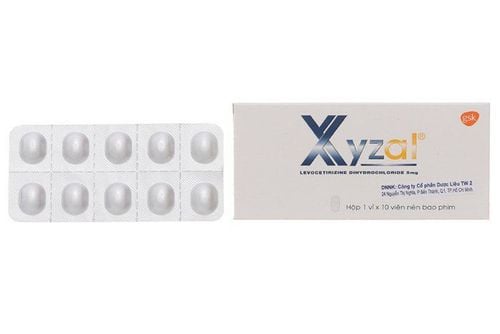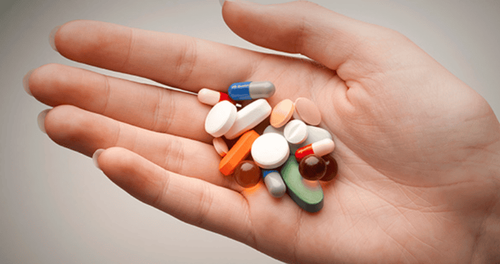This is an automatically translated article.
There are many groups of drugs to treat allergies, but the most common is the group of antihistamines, in which the most popular product of this group of drugs is the drug Chlorpheniramine maleate. So what should patients pay attention to when using chlorpheniramine allergy medicine?
1. Allergy medicine Chlorpheniramine Maleate
Chlorpheniramine maleate is an antihistamine that helps relieve symptoms of allergies, hay fever and the common cold. Chlorpheniramine maleate is effective for symptoms such as rash, watery eyes, runny nose, itchy eyes, nose, throat or skin, coughing and sneezing.Allergy medicine Chlorpheniramine blocks the effects of histamine, the active substance produced when the body reacts to allergens that enter the body. In addition, Chlorpheniramine maleate also inhibits the effect of acetylcholine, thereby reducing the secretion of some body fluids and treating unpleasant symptoms such as watery eyes and runny nose.
Cough and cold medicines are not safe for children under 6 years old, including Chlorpheniramine maleate. Therefore, do not use this allergy medicine to treat cold symptoms in children under 6 years of age unless specifically directed by your doctor. In addition, chlorpheniramine maleate in the form of long-acting tablets or capsules is not recommended for use in children under 12 years of age. The allergy medicine Chlorpheniramine only treats symptoms, does not shorten the duration of a cold, and can cause serious side effects if used for a long time. To limit this problem, patients need to follow the instructions on the dosage of the drug. In addition, do not use other cough and cold medicines that contain chlorpheniramine or similar drugs.
2. How to use chlorpheniramine allergy medicine
Before using Chlorpheniramine maleate, read the package insert carefully or use the medicine exactly as directed by your doctor.Chlorpheniramine maleate tablets, capsules or solution to be taken orally with or without food. Make sure to use the correct dose according to the directions on the package or as directed by your doctor. Chlorpheniramine maleate should be taken after meals in people with stomach ulcers. For chlorpheniramine extended-release capsules, the tablet should be swallowed whole, not crushed or chewed, as this can release all of the drug at once and increase the risk of side effects. Chlorpheniramine maleate drug is in solution form, patients should measure with drug measuring device before use for the most accurate dose.
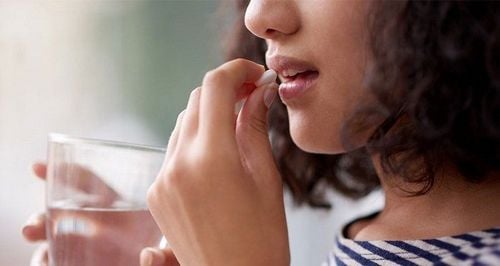
Thuốc Chlorpheniramine maleate dạng viên nén được sử dụng bằng đường uống
If the allergy persists, gets worse, or begins to develop other abnormalities, the patient should contact a medical facility immediately.
3. Chlorpheniramine maleate side effects
Common side effects when using Chlorpheniramine maleate include:
Drowsiness; Dizzy; Constipation; Stomach pain ; Blurred vision; Dry mouth, nose or throat. Some side effects are serious but less common and need to be reported immediately to a doctor such as:
Mental changes such as restlessness, confusion; Difficulty urinating; fast or irregular heartbeat; Convulsions. Chlorpheniramine allergy medicine can still cause allergic reactions when used but very rarely. In addition to the undesirable effects mentioned in the article, patients using Chlorpheniramine maleate may experience other unusual signs. Then contact your healthcare provider for instructions on how to handle it.
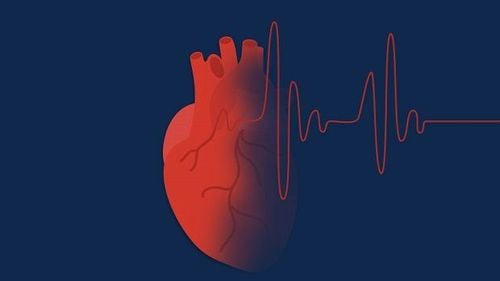
Nhịp tim nhanh hoặc không đều là một trong các phản ứng phụ ít gặp khi dùng thuốc
4. How to prevent chlorpheniramine allergy drug side effects
Inform physician if patient has a history of allergy to Chlorpheniramine maleate or dexchlorpheniramine or any other allergic condition. The patient's medical history should note some medical conditions before using Chlorpheniramine maleate, including:
Asthma, emphysema; Glaucoma; Cardiovascular disease, high blood pressure; Liver failure; Epilepsy ; Gastrointestinal abnormalities such as ulcers or blockages; Hyperthyroidism ; Difficulty urinating due to prostate enlargement. Chlorpheniramine maleate solution may contain aspartame, sugar, and alcohol. Therefore, caution should be exercised in patients with diabetes, alcoholism, liver disease, phenylketonuria (PKU) or any other condition that require limiting these substances in their diet.
Older adults are more susceptible to the side effects of Chlorpheniramine maleate, especially drowsiness, dizziness, confusion, constipation or difficulty urinating. Therefore, this subject needs to be very careful when using the drug.
Children using this allergy medicine may be more sensitive to side effects. In particular, the drug Chlorpheniramine maleate, instead of causing drowsiness, can cause excitement in young children. For women during pregnancy, chlorpheniramine maleate should be used only when clearly needed and should be discussed with your doctor about the risks and benefits. In addition, Chlorpheniramine maleate may pass into breast milk. Therefore, it is necessary to consult a doctor before using the drug and breast-feeding.
5. Chlorpheniramine drug interactions
Drug interactions are factors that change the way a drug works and increase the risk of unwanted side effects. Before taking chlorpheniramine maleate, patients should talk to their doctor about all medications they are taking to look for dangerous drug interactions. Some products that may interact with Chlorpheniramine maleate are: Topical antihistamines (diphenhydramine cream), ointments, sprays containing an antihistamine.
Tell your doctor if you are using products that cause drowsiness such as opioid pain relievers or cough suppressants, alcohol, marijuana, sedatives or anxiety relievers (such as alprazolam, lorazepam, zolpidem), relaxants muscle (such as carisoprodol, cyclobenzaprine), or other antihistamines (such as cetirizine, diphenhydramine). Some anti-allergy or cough-and-cold products may contain ingredients that cause drowsiness. So talk to your pharmacist about how to use these products safely.

Người bệnh có thể nhờ sự hỗ trợ từ dược sĩ về cách sử dụng thuốc an toàn
Chlorpheniramine maleate has similar effects to dexchlorpheniramine. Therefore, do not use products containing dexchlorpheniramine while taking Chlorpheniramine maleate. Symptoms of an overdose of Chlorpheniramine maleate may include: dilated pupils, flushing, fever, hallucinations, weakness, tremors, muscle convulsions, loss of consciousness, generalized convulsions. In children, euphoria may appear first, followed by loss of coordination, drowsiness, loss of consciousness, convulsions.
Chlorpheniramine maleate is an allergy medicine belonging to the antihistamine group, in order for the drug to be most effective, patients need to strictly follow the instructions of the doctor. In case the use of the drug is not effective, the patient should stop the drug and go to the medical facility for examination and treatment.
Vinmec International General Hospital is the address for examination, treatment and prevention of diseases. When performing the examination process at Vinmec, customers will be welcomed and used modern facilities and machinery along with perfect medical services under the guidance and advice of doctors. Good doctors, well-trained both at home and abroad.
Please dial HOTLINE for more information or register for an appointment HERE. Download MyVinmec app to make appointments faster and to manage your bookings easily.
Reference source: webmd.com



